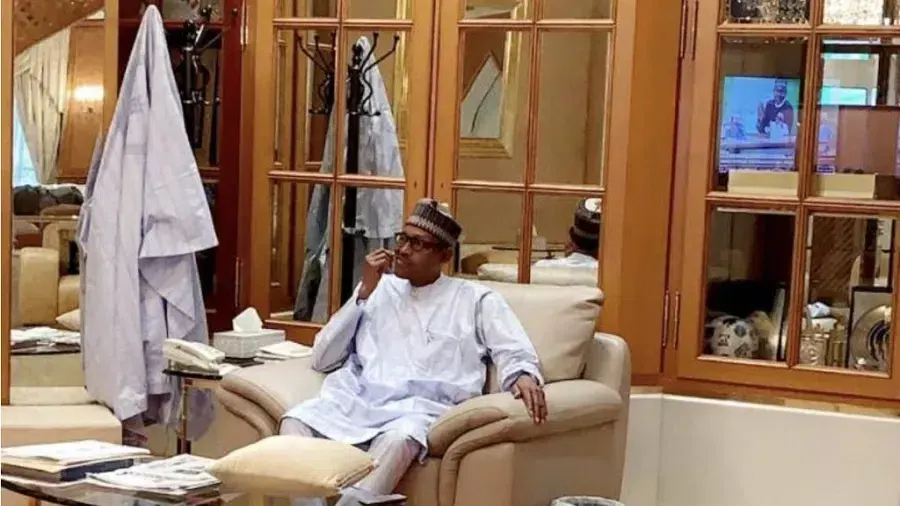
The Legacy of Muhammadu Buhari and the Contradictions of Power
The passing of former Nigerian President Muhammadu Buhari has sparked a wave of reactions across the nation. His death, announced late last night, came after a brief illness at a private hospital in London on July 13, 2025. While some mourned his loss, others celebrated, reflecting the polarized views about his presidency. Many Nigerians, particularly the youth, saw his tenure as one marked by economic struggles, broken promises, and a lack of decisive action during crises.
Buhari’s time in office was characterized by two recessions, which deepened the challenges faced by ordinary citizens. Despite these hardships, his administration maintained an extravagant lifestyle within Aso Rock, the official residence of the president. This contrast between the suffering of the populace and the opulence of the presidential palace became a source of public frustration.
Expenditures at Aso Rock: A Disproportionate Allocation
In 2017, the budget for the State House included ₦850 million allocated for food, cooking gas, and kitchen utensils at Aso Rock. This figure was part of a larger ₦42 billion budget for the presidential complex. Analysts highlighted that the utensil budget alone could have funded at least five health centers. Over three years, the presidency spent over ₦420 million on catering equipment, excluding food and gas—enough to address malnutrition in internally displaced person (IDP) camps.
Despite these exorbitant expenditures, Buhari was known for his simple tastes. A close associate, Alhaji Ahmed Babankowa, a retired police commissioner, shared insights into the former president's dietary habits. He revealed that Buhari had a deep affection for tuwo alikama, a wheat-based dish, often served with okra soup. Even while traveling, meals were pre-packed and stored in the convoy. His beverage choices were equally modest, consisting of Fanta, Coca-Cola, and water—no alcohol or wine.
The Paradox of Simplicity Amidst Opulence
Babankowa also noted that Buhari never missed his three square meals, yet the operations of Aso Rock remained far from frugal. This contradiction became a focal point for public scrutiny. In 2015, a friend of Buhari mentioned that his favorite meal was a humble one, not steak or anything extravagant.
Garba Shehu, Buhari’s former spokesperson, attempted to portray a more modest image of the president in his book Lessons from a Presidential Spokesperson’s Experience. He described Buhari as someone who ate basic foods, such as yam porridge and other local dishes. Shehu claimed that Buhari once rejected a ₦10 million meal budget, insisting it be reduced. However, this narrative contrasts sharply with the lavishness observed in the presidential complex.
A Pattern That Persists
The extravagance seen under Buhari’s leadership appears to continue with the current administration. In 2024, President Bola Tinubu and Vice President Kashim Shettima allocated ₦660.5 million for meals, amounting to ₦1.8 million daily. The president’s office alone will spend over ₦287 million on foodstuffs and another ₦33.6 million on “refreshments and meals.”
If Tinubu’s spokesperson were to write a similar book, claiming that his best food was agbado paired with ube, would that come as a surprise? While Buhari may have had simple tastes, the structure and operations of Aso Rock were anything but frugal. Whether the accounts of modesty are accurate or not remains uncertain, but the disparity between the lives of leaders and the general population continues to fuel public debate.
Reflections on Leadership and Public Perception
Buhari’s legacy is thus a complex mix of personal simplicity and institutional excess. His death has prompted reflection on how leaders are perceived and the expectations placed upon them. For many Nigerians, the contrast between their struggles and the opulence of the presidency has been a persistent source of frustration.
As the nation grapples with these contradictions, the question remains: can true leadership be defined by personal humility when the structures it operates within are steeped in extravagance? The answer may lie in the actions of future leaders and their commitment to addressing the needs of the people rather than maintaining the status quo.


Posting Komentar